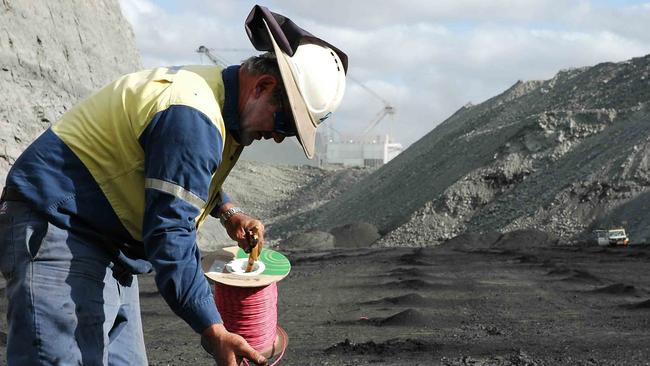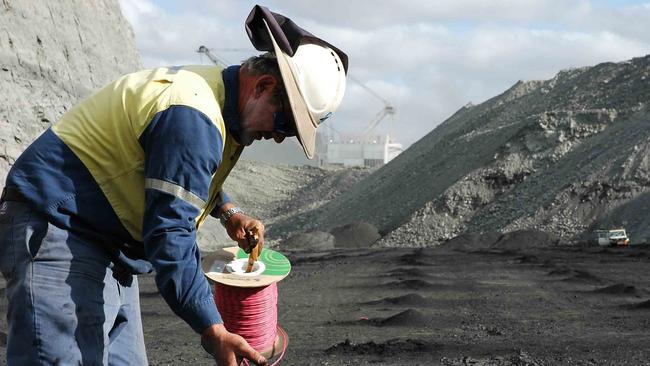Orica posts improved earnings, says it will take time to exit its Russian business
The explosives major has been operating its mining services business in Russia for more than 20 years, but now plans to exit in a “safe, orderly and respectful” manner.

Orica boss Sanjeev Gandhi says the explosives major is still to decide how it will wind down its mining services and explosives business in Russia, despite the company writing off the value of the assets in its half-year financial accounts.
Shares in Orica surged on Thursday on the back of a much improved interim financial results, with its stock up 8.2 per cent at $16.95 just after lunch time after reporting a 56 per cent jump in underlying pre-tax earnings.
It booked a statutory loss of $85m, largely as a result of its decision to exit its Russian operations.
Orica has more than 500 employees in Russia, and supplies blasting and mining services across the country, with the majority of its work with Russian fertiliser and potash majors.
The company took an $80m hit in its half-year financial accounts through the write off of its entire Russian business, and said it would wind down its involvement in the country over the next six months as a result of Russia’s invasion of Ukraine.
Mr Gandhi told The Australian the company was yet to work out how it would wind down its affairs in Russia, and whether it would look to mothball its operations in the country or seek to transfer them to a “responsible” alternative owner.
“The pressure of sanctions and the supply chain disruptions meant that it was just not tenable for us to continue the business in any kind of sustainable form, and more importantly, while trying to operate safely there,” he said.
Orica has been doing business in Russia for more than 20 years, and its last annual report shows the company has at least four Russian subsidiaries on its books.
Mr Gandhi said the Orica board had only recently made the decision to exit Russia, and Orica was still working through the Russian bureaucratic system to manage the wind-down of its affairs in a “safe, orderly and respectful manner”.

The Orica boss said the nature of the company’s explosives and technology business would complicate its exit, given some of its equipment could in theory find alternative uses in military hands.
He said Orica was working through how it would deal with its explosives and blasting inventory and, despite threats by Russian President Vladimir Putin to seize control of the assets of Western businesses leaving the country, it was not yet clear how Russian authorities would react to Orica’s decision.
“We are a critical supplier to the ag industry because our major exposure there was food – it was more potash, it wasn‘t really coal,” he said.
“So we were in a more sensitive and important market segment and that is why it‘s extremely important that whatever we do there – whether it’s a clean cut exit by shutting down operations and mothballing our units, or by handing it over to a another responsible owner – it will be done in a very planned and sensible manner.”
Macquarie Research analysts estimated on Thursday that Orica’s Russian operations contributed about $15m to $20m to the company’s underlying earnings on an annual basis.
Orica said the disruptions caused by Russia’s invasion of Ukraine had also forced the company to find new sources of ammonium nitrate to service its mining clients, given Russia is a major global source of the chemical.
The conflict in Europe also contributed to surging input costs for Orica’s manufacturing plants, and exacerbated widespread logistical problems afflicting the entire mining supply chain.
But despite the ongoing volatility in global markets, the commodity price surge over the last six months helped Orica to an improved result, with the company declaring a 13c interim dividend on the back of earnings of $230.2m before interest and tax.
Orica booked a net loss of $84.6m, after taking an $80m impairment through the write-off of its Russian assets, along with a and $33m of impairments against its business in Turkey. It also took a $45.3m impairment against the value of the goodwill in its European business.
But earnings before interest and tax for the six months to March 31, rose 56 per cent to $230.2m. That figure excludes the contribution of Orica’s offloaded Minova business, which added another $14.7m to Orica’s overall EBIT.
Revenue across the company’s operations was up 25 per cent to $3.27bn.
While Orica said its improved return for the half came on the back of the massive commodity price surge, driving increased demand for the company’s services in the period, Orica warned rising input costs were having an impact on its business.
“Elevated commodity prices and strong mining activity in the region drove high demand for ammonium nitrate, electronic blasting systems, cyanide and blasting services. This increased demand, coupled with commercial discipline enabled improved pricing,” the company said.
“Pricing improvements have been realised in contract renewals and new contracts. However, EBIT continues to be constrained due to the lag in passing through rising inflation, freight, and ammonia costs through contractual arrangements with customers.”





To join the conversation, please log in. Don't have an account? Register
Join the conversation, you are commenting as Logout